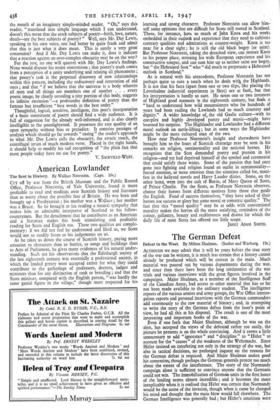American Lowlander
The Scot in History. By Wallace Notestein. (Cape. 16s.) CUT off by war from the British Museum and the Public Record Office, Professor Notesteiu, of Yale University, found it more profitable to read and meditate over Scottish history and literature than to worry about the possible fate of Britain. He was born and brought up a Presbyterian ; his mother was a Wallace ; her mother was a Bruce. So he brought to his reading a natural sympathy that makes him an admirable interpreter of Scotland to his fellow- countrymen. But the detachment that he contributes as an American and a historian makes this book stimulating and profitable reading for Scots and English too. These two qualities are comple- mentary: if we did not feel he understood and liked us, we Scots would not so readily listen to his judgements on us.
As he takes us down the course of Scottish history, paying more attention to characters than to battles, to songs and buildings than to Acts of Parliament, he gives many evidences of his natural under- standing. Such are his observations that the Edinburgh society of the late eighteenth century was essentially a professional society, in which the landed gentry were accepted rather for what they could contribute to the gatherings of professors, doctors, judges and ministers than for any distinction of rank or breeding ; and that the Scots minister, compared with the English parson, "was hardly the same genial figure in the village," though more respected for his learning and strong character. Professor Notestein can allow him- self some opinions that are difficult for Scots still rooted in Scotland.
These, for instance, have. so much of John Knox and his works embedded in their outlook and experience that they need to cultivate contrary qualities and admiration as counter-weight. Knox too near for a dear sight ; he is still the old black bogey (or saint). But Professor Notestein, taking the detached view, can restore Knox to his proper place, stressing his wide European experience and his constructive temper, and can sum him up as neither saint nor bogey, but " the Hebraized Scot " who " did much to perpetuate a Hebraized outlook in Scotland."
As is natural with his antecedents, Professor Notestein has not perhaps quite so sure a touch when he deals wit% the Highlands. It is not that his facts (apart from one or two slips, like placing the Leverhulme industrial experiment in Skye) are at fault, but that his interpretation is hardly so sure. He notes one or two instances of Highland good manners in the eighteenth century, but finds it " hard to understand how wild mountaineers who for hundreds of years had been raiding the Lowlands had so much courtesy and dignity." A wider knowledge of, the old Gaelic culture—with its con'plex and highly developed poetry and music—might have lessened his surprise. The Highlander and Lowlander had a different moral outlook on cattle-lifting ; but in some ways the Highlander might be the more cultured man of the two.
How near Professor Notestein's insight and shrewdness have brought him to the heart of Scottish character may be seen in his remarks on religion, sentimentality and the national heroes. He recognises that the Scot demanded poetry and passion in his religion—and yet had deprived himself of the symbol and ceremonial that could satisfy these wants. Some of the passion that had once gone into fighting and religion found an outlet in sentimentality— forced emotion, or more emotion than the situation called for, mani- fest in the kailyard novels and Harry Lauder ditties. Some, on the other hand, went into the cult of Burns, of Mary Queen Of Scots, of Prince Charlie. Fox the Scots, as Professor Notestein observes, choose their heroes from different motives from those that guide the English. Fond of success themselves, " they have asked of their heroes not success or glory but some moral or romantic quality." The fact that this "moral quality " may be at odds with conventional' morality makes the heroes all the more satisfying, reminders of the colour, gallantry, beauty and recklessness and drama for which the daily life of most Scots has offered too little scope.
JANET ADAM SMITH.


































 Previous page
Previous page